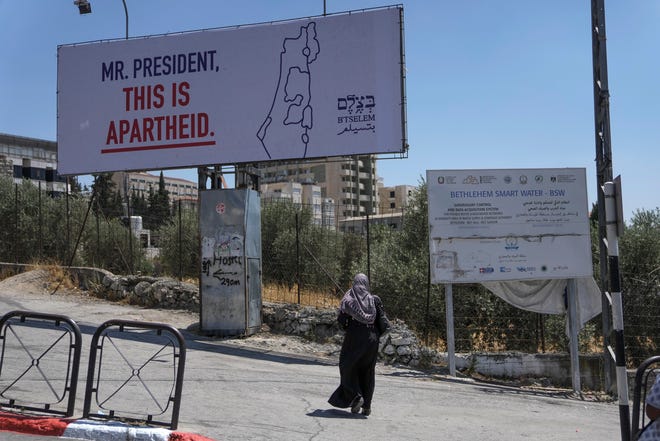
JERUSALEM – Conceding that the "ground is not ripe at the moment," for restarting the peace process with Israel, President Joe Biden on Friday still tried to offer empathy – and some hope – to Palestinians.
The best way to do that, Biden said after announcing new humanitarian assistance, is to improve Palestinians' day-to-day lives.
"The Palestinian people are hurting now. You can just feel it, your grief and frustration," Biden said in a joint appearance in Bethlehem with Palestinian President Mahmoud Abbas.
Nonetheless, Abbas said he stressed to Biden the importance of the "two-state solution" as a foundation for resolving the decades-long conflict.
Abbas also said he's looking forward to the U.S. reopening a consulate in East Jerusalem, something Biden has said he will do but that's opposed by the Israeli government.
Posters reading "Mr. President this is apartheid" were posted along part of Biden's route to Bethlehem in protest of Israelis' treatment of the Palestinians.

The latest
- Restoring ties: Biden has focused during his presidency on restoring ties with the Palestinians that had been ruptured during the Trump administration. Creation of an independent Palestinian nation alongside Israel has been the North Star of a negotiated settlement . In recent years, various developments have diminished that prospect, including the internal political divisions in both camps.
- Another setback: Some of the leverage Palestinians had was lost when Israel normalized relations with several Arab nations, a process started during the Trump administration and that the Biden administration is working to expand.
- Biden’s approach: While the Trump administration considered the so-called Abraham Accords a substitute for progress on an Israeli-Palestinian peace agreement, the Biden administration hopes to leverage normalization as a bridge toward progress on the issue.
- Small steps: As a sign of progress, the Biden administration pointed to the recent phone call between Abbas and Israeli Prime Minister Yair Lapid, the first contact at that level in several years.
- Saudi overtures: Biden is heading to Saudi Arabia after his meetings in Israel on Friday. Ahead of his arrival, the Saudis opened their airspace to “all air carriers,” signaling the end of their longstanding ban on Israeli flights overflying their territory – a key step toward normalization between the two nations. The White House said the decision paves the way for "a more integrated, stable and secure Middle East region."
- Energy announcement?: White House National Security Advisor Jake Sullivan told reporters Friday that "I don't think you should expect a particular announcement" on energy. He added "we are hopeful that we will see additional actions by OPEC Plus in the coming weeks."

What's happening
Bidenannounced several initiatives to benefit the Palestinian people, including more than $316 million in aid for various programs.
- About $100 million will go to the East Jerusalem Hospitals Network to improve Palestinians' access to health care services, such as oncology, dialysis, neo-natal intensive care and specialized maternity care.
- Another $201 million will go to a United Nations relief program to deliver critical services to Palestinian refugees in the West Bank, Gaza, Jordan, Lebanon and Syria.
- Additional initiatives include food security assistance, extending 4G digital access into the West Bank and Gaza, and restarting economic discussions between the Palestinians and Israelis.

Why it matters
East Jerusalem is predominantly Arab and claimed by Palestinian leaders as the future capital of their independent state.
Since then-President Donald Trump recognized Jerusalem as the capital of Israel in 2017, Israeli government officials have participated in visits to East Jerusalem by U.S. officials. But they didn't accompany Biden Friday.
Biden hasn't announced any progress toward his commitment of reopening a consulate in Jerusalem, which had served as a de facto embassy.

Top takeaways
Biden’s attempts to improve conditions for the Palestinians within the confines of the staunch support the United States typically extends to Israel, its top Middle East ally, is a balancing act between stark geopolitical realities and his lofty promise to put human rights at the center of his foreign policy.
In Bethlehem, Biden called it "heart-wrenching" that so many Palestinians have lost their lives to violence, including a journalist, Palestinian American Shireen Abu Akleh, who was shot dead in May while reporting on an Israeli military operation in the occupied West Bank.
"The United States will continue to insist on a full and transparent accounting of her death," Biden said, "and will continue to stand up for media freedom everywhere in the world."
Several Palestinian journalists covering Biden's remarks wore black “Justice for Shireen” T-shirts.
In Saudi Arabia, Biden will be scrutinized for what he says about the gruesome murder of another journalist, Washington Post columnist Jamal Khashoggi. American intelligence officials concluded that Saudi Arabia's crown prince Mohammed bin Salman, approved the operation "to capture or kill" Khashoggi.
Biden has been criticized by some for visiting Saudi Arabia, which he vowed as a candidate to make a “pariah” state because of its human rights abuses. But diplomatic pragmatists say Biden must continue to engage with Saudi Arabia to have influence in the region.

What they are saying
- After Biden’s remarks at Augusta Victoria Hospital in East Jerusalem on Friday, a head nurse for the pediatric intensive care unit of the hospital told Biden “Thank you for your support, but we need more justice, more dignity."
- "Israel must remain an independent, democratic, Jewish state," Biden said during a news conference on Thursday. "The best way to achieve that remains a two-state solution for two people, both of whom have deep and ancient roots in this land, living side-by-side in peace and security."
- At that same news conference, Lapid also said the two-state solution is "a guarantee for a strong democratic state of Israel with a Jewish majority." But he is serving as an interim prime minister amid looming elections.
- "Biden is not in a position to talk about borders, security arrangements, or the administration of Jerusalem, but he can do what is needed for this moment, which is to remind everyone what the conflict is truly about and what any solution must take into account," Michael Koplow of the Israel Policy Forum wrote Wednesday in a blog for the Times of Israel.
Want to know more? Here's what you missed
Emphasis on security:Biden's visit to Israel starts with security issues as US officials fret about Iran's threat
'A good beginning'?Tensions over Iran nuclear deal disrupt Biden's kumbaya moment in Israel
Saudi 'culpability':Biden defends Saudi Arabia visit after Khashoggi murder, says he's 'never been quiet' on human rights
A signal of 'impunity'? Biden's trip to Middle East pits human rights against geopolitical reality
Political upheaval:Israel heads for unprecedented fifth election in three years after government collapses

Contributing: The Associated Press
Source link







